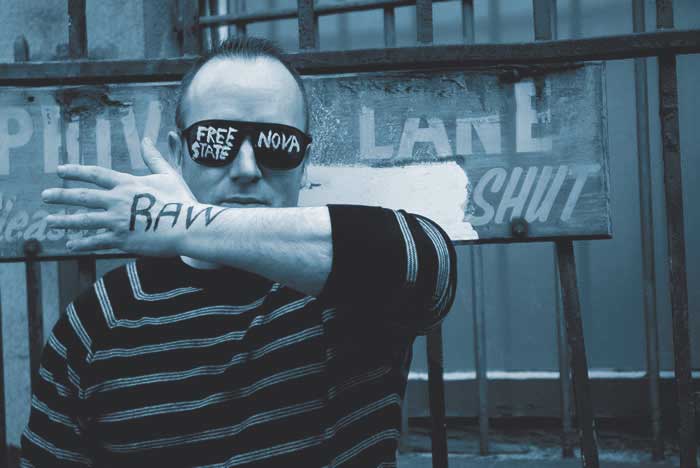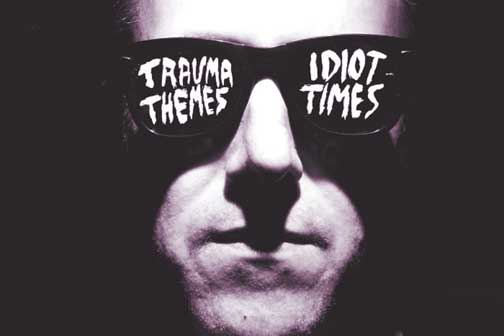


SERVICES
Tuesday August 5, 2009
When Music Is The Question
Working Class Hero: Jinx Lennon By Joe Kavanagh As the Irish economy continues to circle the bowl, buckled and broken by the greed of rapacious banks, unscrupulous developers and the silence of too many people who expected the Golden Goose to live forever, it has become fashionable to knock the greed that gripped the country for the past 15 years or so. Like trying to find someone that opposed integration in post-1970 Mississippi, or a voter that cast their lot with George W Bush, it is almost impossible to find people in Ireland who will confess to being overtaken by the voracity that fed the Celtic Tiger, until it became so avaricious that it consumed itself. Caught up in the infectious materialism that consumed the country, even the most cynical will now admit that the nation lost some of its identity in recent times, an issue that we are now trying to redress as we awaken from a spell that is now be seen for the illusion it truly was. While many are quick to deny that they were ever swept up in fevered materialism brought about by a broke nation suddenly coming into money, the list of names that openly questioned where we were traveling as we held onto the Tiger's tail is pitifully puny. Only now, when the money is gone, has the debate over who we are as a nation and where we are going as a race, truly become an issue that engages most Irish people, though there were a scant few who viewed Ireland's economic boom as the sound of a cultural bomb going off. Jinx Lennon was one such voice; an artist that is perhaps only matched by Damien Dempsey, in terms of questioning just which way the good ship Ireland has been headed over the past decade. Bono is the consummate example of what those in literature might term a high-mimetic hero; a man who views himself - and is in turn viewed by many - as being above the people, pursuing a noble calling that keeps him apart from the rest of us mere mortals. In contrast, everything about David 'Jinx' Lennon is of the low-mimetic variety, a man born of the people, who speaks with our voice and articulates many of our fears as he struggles with the same issues that we do on a daily basis. Born and raised in sometimes gritty but always colorful town of Dundalk, Co. Louth, his introduction to music involved a peculiar fusion of rebel music, soul music and crooners, handed down to him by his parents and family whose tastes ranged wildly. Growing alongside this love of music was an equally abiding affection for the written word, most particularly that of music journalists such as Steve Sutherland and Paul Morley, whose work instilled in him the realization of just how powerful music could be as a creative force. As time went on, and his love affair blossomed, he was introduced to such names as Television, Elvis Costello and The Fall's Mark E. Smith, provocative artists whose influence would later shape his own songwriting style. Always an independent operator, while others were falling under the hugely-hyped charms of Brit pop in the mid-90s, Lennon was immersed in hip hop, absorbing the anger, imagination and vigor of acts like Wu Tang Clan, Mobb Deep and Special Ed. As the Celtic Tiger began to walk the land, Lennon made a name for himself with Dundalk acts like Silver Seeds and Novena Babes, bands who were little more than local heroes, but were responsible for one particular watershed moment in his development. As anyone who is familiar with Dundalk will tell you, the Louth accent is one of the strongest and most unique in Ireland, something that Lennon viewed as a hindrance early in his career, as he attempted to water it down in his singing voice. Listening back to recordings of one particular jamming session, however, he noticed that upon launching into an off-the-cuff ditty called, Get The Guards, sung in an unapologetically Louth accent, the music became imminently more vibrant. The epiphany saw him immediately drop all attempts at hiding his accent as he moved on to a career as a solo artist under his new moniker. From his earliest days in the late-90s, Jinx Lennon was one of the most articulate voices in Irish music to take to task what he termed 'the Septic Tiger', and he soon built a reputation as Ireland's pre-eminent punk-poet in the mold of John Cooper Clarke. While his ethos might well be born of the punk tradition, his music draws from a far wider field of influences, another trait that was evident from his earliest days as one of the nation's most unapologetically original acts.
Released in 2000, Jinx Lennon: Live at the Spirit Store, is an entirely befitting debut album for such a unique artist, replete with drunken hecklers, and a nerve wracked Lennon, who traverses a multitude of musical styles, including cover versions of Public Enemy, Wu Tang Clan and even Culture Beat's Mr. Vain. He continued his path of intelligent discourse mixed with madcap flourishes with his next two albums, the superbly named 30 Beacons of Light for a Land Full of Spite, Thugs, Drug Slugs and Energy Vampires (2002) and Know Your Station, Gouger Nation (2005). Both could be termed unconventional protest albums, offering social commentary on a country that appeared to have lost its way somewhat and, worse still, didn't seem to care. In contrast to most protest writers however, Lennon's work is never preachy, as he offers himself up merely as an observer shining a light on the issues while leaving us to make up our own minds on where to stand on them. His work is also typified by a supreme honesty, superb literary skills and a positively wicked sense of humor in a tradition that is as much Flann O'Brien/Myles na gCopaleen/Brian O'Nolan as any Irish music equivalent. He is, as he puts it a songwriter that "likes to get his hands dirty", and of his 2005 work, once declared: "I wanted this one to be more of a protest album about Ireland because I was tired of listening to insipid singer songwriter types sounding like greenfly on a rose bush waiting for a German shepherd dog to p*** over them while the world fell to pieces around them." Accentuating this recording output was a live show that has become something of an underground legend around Ireland. Touring the length and breadth of the country, he has earned a reputation as one of the hardest working and most entertaining live performers that the country has ever seen. As anyone who has been lucky enough to catch one of his shows will attest to, a Jinx Lennon show is a gloriously irreverent affair that borders on the evangelical. Oozing stage presence he delivers impassioned versions of his songs, interspersed with spontaneous outbursts and the type of storytelling that is sadly lacking in many modern artists. His reputation is such that Ireland's national television station, RTE, commissioned a documentary on his life in 2007, Noisemaker, which offered a snapshot of this compelling and cerebral character. In April of this year, he returned with his most accomplished work to date, Trauma Themes: Idiot Times, an album that continues his analytical questioning of society, life and love, while managing to grow exponentially in a musical sense. It is perhaps darker than previous works, with many of the lighter moments given emphasis by the vocals of his longtime collaborator and real life love interest, Paula Flynn. Song titles such as Everyone's Got A Mental Home Inside Their Head, The Men Who Saved The Face Of Football, and My Head Is Slowly Disappearing Up My Own Arzzzz, continue his mischievous scrutiny of our surrounds but it's not all fun and games. Inspired by a recent legal case that gripped the nation, concerning the trial of Mayo farmer Padraig Nally who shot and killed intruder/thief John 'Frog' Ward, Lennon is at his poetic, impious, rationalist best, singing: "If someone breaks into your house to murder you/ You should be entitled to stick a knife in their eye and say/ Listen if one of us is going to die/ It's not going to be me." It is an album that shows further progression in the career of an Irish act of more than a little importance, and perhaps now - more than ever - people will be willing to listen to an artist who has lived too long in the Irish underground. Jinx Lennon is not just uniquely Irish, he is quite simply unique, which coupled with his immense talent, forthrightness and messianic mission makes him a splendid splash of color in a music world frequently populated by people whose entire personas exude gray. |
CURRENT ISSUE

RECENT ISSUES


SYNDICATE
[What is this?]
POWERED BY

HOSTED BY

Terms of Service | Privacy Policy
Website Design By C3I







